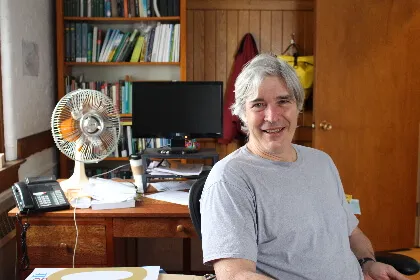In just a few weeks, CDAE Professor Josh Farley will be on a plane to Brazil to continue his research on the interconnections between agroecology, ecosystem services, economic institutions and human welfare in the Atlantic Forest.
Since 2009, Farley has been working with Brazilian farmers, the Santa Rosa De Lima government, and the Federal University of Santa Catarina to create sustainable solutions for the fragile forest system – 85% of which is now destroyed.
The focus is on the economics of what is essential and Farley argues that although food is the most important thing to produce, it is also the most threatening to the ecosystem. The only way to solve this catastrophic situation is to develop agricultural methods that simultaneously benefit the ecosystem as well as the economic well-being of local farmers, all while feeding the region – home to two-thirds of Brazil’s population; but, developing the agricultural methods is only the first part of the solution.
To effectively implement changes, Farley and his team are collaborating with “state, local, and national government to develop policies that will disseminate the practice across the landscape at the pace necessary to prevent ecological collapse,” he explains. The dissemination of the newly developed agricultural methods, he argues, justify the work they are doing: without widespread adoption, the developed methods would not provide great value to Brazil and its people.
Although agroecological practices are more labor- and knowledge- intensive, they produce higher yields while cutting down on fossil fuels; in other words, the work is well-worth the costs.
“Every region can have its own agroecological system,” adds Farley. This can be as simple as adding leaves or grass from your yard to the soil of your garden to add nutrients, instead of buying toxic fertilizers. Similarly, the practices Farley and his team are developing will help to revitalize and preserve the ecosystem in the Atlantic Rainforest, while producing native food to feed the region.
“Let’s do the right thing while we have time,” suggests Farley. Through this particular case study, he and his colleagues are hoping to create techniques that can be replicated worldwide.
